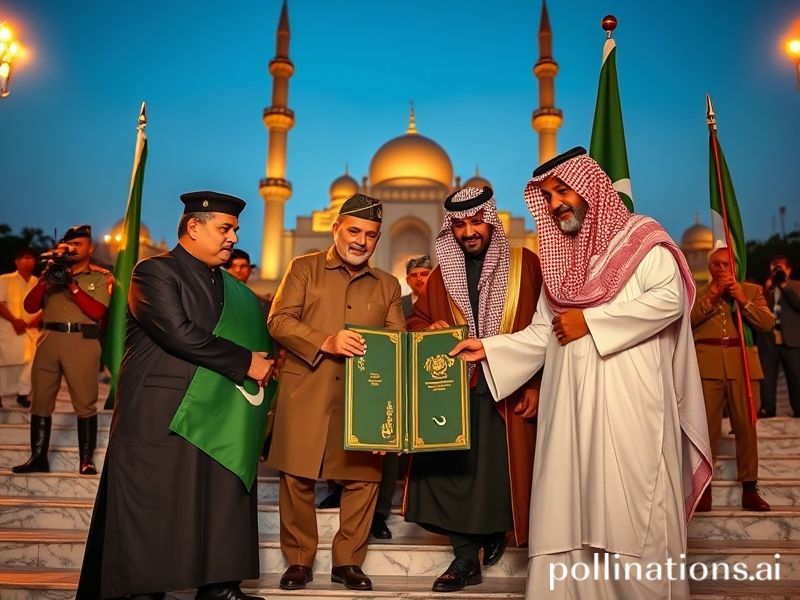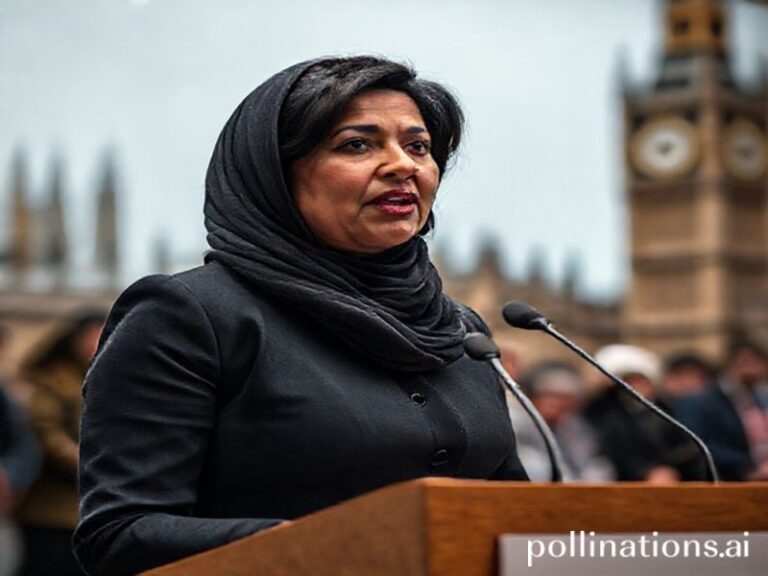Oil, Nukes & Bromance: Inside the Pakistan-Saudi Defence Pact the World Is Pretending Not to Panic About
Riyadh and Islamabad have decided to upgrade their long-running mutual-assistance flirtation to a full-blown defence pact, and the rest of the planet is trying to figure out whether this is a marriage of convenience or just another pre-nup written in disappearing ink. Signed on 22 April 2024 after a ceremony featuring more sabre-rattling choreography than a K-pop concert, the agreement promises “joint training, intelligence fusion, and interoperability in times of crisis.” Translation: if either country feels threatened—by Iran, by India, by a rogue drone with a bad attitude—the other will scramble planes, share satellite feeds, and, presumably, forward the WhatsApp group chat.
For Saudi Arabia, the timing is exquisite. Crown Prince Mohammed bin Salman, fresh from buying Newcastle United and half of global golf, now wants a reliable Muslim-majority army that doesn’t come with NATO strings or French invoices. Pakistan, perennially broke and geopolitically friend-zoned by Washington, gets a sugar-daddy who pays in advance and never asks awkward questions about civilian casualties. It’s the sort of transactional romance that would make Tinder blush, yet both sides insist it’s “strategic depth,” not a geopolitical booty call.
Globally, the pact rearranges deck chairs on several already listing ships. Tehran is quietly updating the Persian playlist titled “Neighbours Who Hate Us” and ordering extra air-defence batteries from whoever hasn’t been sanctioned this week. India, which used to rely on Riyadh’s studied neutrality in South Asian spats, now wonders if its cheap oil comes with a side of Pakistani battle plans. Meanwhile, Washington mutters something about “regional stability,” then goes back to arguing about TikTok bans, because nothing says superpower like outsourcing your Middle-East policy to a memo no one reads.
Defence-industrialists from Ankara to Baku are salivating: Pakistani pilots get to train on Saudi F-15s, Saudi cadets learn mountain warfare in Murree, and everyone agrees the billable hours will be denominated in petrodollars. Somewhere in a glass tower in Shenzhen, a Chinese executive updates the Belt & Road PowerPoint: “Insert new axis here.” In Moscow, Lavrov sighs, remembers the good old days when only the superpowers wrote the scripts, and books another flight to Riyadh to remind them Russian air-defence systems are still attractively priced, vodka included.
The pact also nudges the ever-fragile Gulf balance. Qatar, fresh from hosting the World Cup and still pretending labour reforms are a thing, now wonders if its shiny new Turkish base looks lonely. Oman, the Switzerland of sand, tightens its neutrality seatbelt. And Israel—yes, Israel—watches from the Abraham Accords balcony, calculating whether a Sunni-Pakistani shield makes an Iranian strike less likely or just more creative.
There is, of course, the small matter of credibility. Pakistan’s army hasn’t decisively won a war since 1965, and Saudi Arabia’s last large-scale ground operation ended up stuck in Yemen’s mud like an overpriced SUV. Still, deterrence is 10% capability and 90% PowerPoint, and both militaries have excellent slide decks. The real currency here is symbolism: two states with nuclear neighbours and chronic identity crises telling the world they have each other’s backs. Think of it as geopolitical couples therapy, except the therapist is paid in oil concessions and the homework involves joint air exercises over the Persian Gulf.
Will the pact survive the first real crisis? History suggests the ink dries faster than the resolve, but for now the deal injects a fresh dose of uncertainty into a region that already runs on it. For the rest of us, it’s another reminder that alliances are less about shared values than shared anxieties, and that the global security market still rewards the best panic-merchants. Meanwhile, the arms dealers upgrade their frequent-flyer status, the oil futures twitch, and the planet shrugs—because in the grand bazaar of international relations, every transaction comes with a free side order of existential dread.







